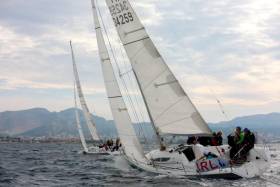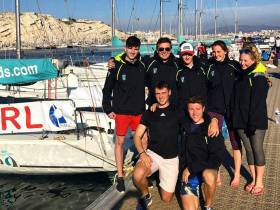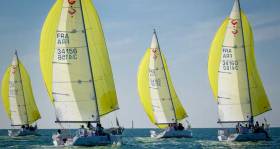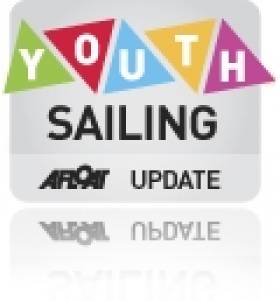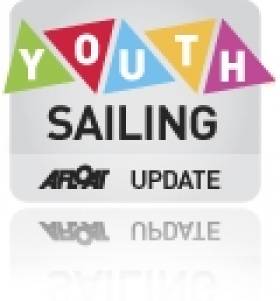Displaying items by tag: SYWoC
UCD Finish Fifth Overall at Student Yachting World Cup
UCD Team Ireland finished fifth overall in the Student Yachting World Cup in France today. The Dublin team was disappointed that the last day of racing had to be cancelled due to lack of wind, but are very happy with their overall result.
The event in general provided spectators with some very exciting racing. While the Scottish team pulled ahead early in the competition, in the end it was Team Japan who won the SYWOC title.
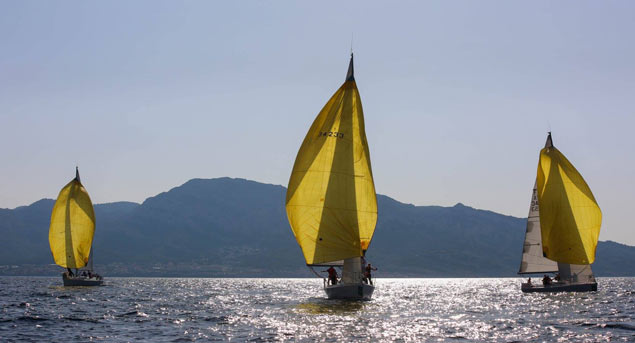 The Dublin team was disappointed that the last day of racing had to be cancelled due to lack of wind
The Dublin team was disappointed that the last day of racing had to be cancelled due to lack of wind
With a number of top three finished throughout the week, Team Ireland certainly were in contention for a podium finish, but unfortunately it was not to be.
The young team, skippered by Jack Higgins, will be setting their sights for the Irish Student Yachting Nations in April to qualify again for next year.
UCD Sailing Team Lying Fifth at Student Yacht World Cup in France
After a lively opening ceremony held on Tuesday night, the UCD Team Ireland had an exciting first day of racing today at the Student Yachting World Cup in France.
Enjoying moderate winds, the Race Officer managed to run five races today, including four inshore races and a coastal race.
The Irish representatives secured three third places, a fourth and a fifth. They lie in fifth place overall, with only five points between the first five boats.
With another four days of racing lying ahead, everything is still to play for.
UCD Sailing Team Compete at Student Yachting World Cup
UCD Sailing Team set off yesterday to compete in the Student Yachting World Cup, held near Marseille, France. Having qualified against stiff competition at the Student Yachting Nationals in April, the team will represent Ireland in the week to come. The five day event will consist of both inshore races, coastal races and a night race, all in Grand Suprise keelboats.
Skippered by Jack Higgins, the teams consists of Patrick Cahill, Conor Foley, Nicole Hemeryck, Lucy McCutcheon, Luke Murphy and Conor Kneafsey. Following an illustrious history of SYWOC podium finishes in the last ten years, the young UCD team hopes to bring home another medal for Ireland.
It has been a busy few weeks for UCD, with the SYWOC event and the first team racing event of the season (run by UCD in Wexford) falling in the same week.
UCD Students Place Third In 2015 Student Yachting World Cup
#SYWoC - The team from University College Dublin have place third in this year's Student Yachting World Cup.
Ryan Glynn (skipper), Ronan Jones, Colin O’Mahoney, Cliodhna Conolly, Cian Cahill and Emma Reidy beat such noble institutions as Cambridge and Oxford to the bronze position, behind the University of Southampton and SYWoC winners from the Ecole Polytechnique Federale de Lausanne in Switzerland.
As previously reported on Afloat.ie, it was UCD's fourth participation in the week-long racing event, where they previously lifted the cup in 2012.
Sailors from Trinity College Dublin – also previous cup winners, in 2006 – were also competing but failed to make the top 10.
UCD Sailing Team Return To Student Yachting Worlds 2014
#sywoc – UCD will return to the Student Yachting World Championships next month to represent Ireland for the third year in row and as previous winners in 2012. UCD launches its team for the 34th Student Yachting World Cup this coming Saturday, October 4th. The event will be held in the Royal Irish Yacht Club, Dun Laoghaire at 5pm. The team and its sponsors will be announced.
The SYWoC (Student Yachting World Cup) is an event organized every year in France by students for students. The event has been taking place since 1979 and is seen as the most prestigious keelboat competition in the student sailing calendar.
This year's event is being held in La Rochelle from October 15th-22nd. The championship will be sailed using Grand Surprise 32s designed by Joubert-Nivelt. UCD Team Ireland will travel with high aspirations having won the event in 2012 at the same venue.
Fifteen teams from as far as China, Australia and the USA are expected to compete and represent their universities and nations. The sailing crew will be composed of a minimum of 6 members and a maximum of 8 members with at least 2 women and two men on board.
Irish Team Ready for Student Yachting World Cup
Yesterday marked the beginning of the 30th Student Yachting World Cup (SYWoC), and for the Irish Team, it was the first opportunity for some of them to check out La Rochelle. This year's Team Ireland consists of a joint effort between UL, LIT and UCC.
The team consists of Skipper Robert O'Leary(UCC), Cian Gallagher (UL), John Blake (UL), Dee O'Rourke (LIT), Lisa Dann (UCC), Caitlin Cuppage (UCC), Shane Newman (UL), Peadar O'Suilleabhain (UL), Jamie Donegan (UCC). The team will race with 6 or 7 up depending on the weather for the week, currently the forecast is looking quite light. Not what was expected for this time of year in La Rochelle.
After an early start at 7am this morning, the team travelled to the Societé de Regatis Rochelouies, the club which hosted the very first SYWoC in 1979. And which is SYWoC's base for the week.
A practice race was scheduled for 2pm, after a general briefing at 1pm. However, with wind gusting over 30kts, the race organisers decided that it was not worth risking the fleet with 6 days of racing ahead. The teams will be given an hour prior to racing tomorrow to put the final preparations on their 2010 SYWoC campaigns.
Team Ireland will hope to keep the title of a force to be reckoned with, after all the past 4 SYWoC campaigns for Ireland have had results of a 1st (Trinity - 2006), 2nd (CIT - 2007), 1st (CIT - 2008), 4th (CIT - 2009).


























